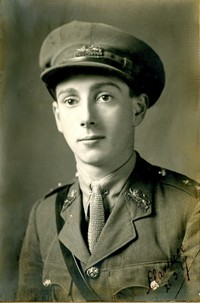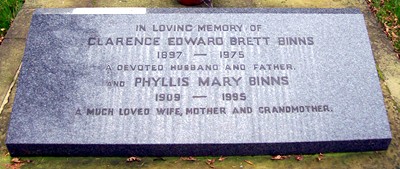|
Clarence
Binns
1897-1975
|
 |
A man with a highly adventurous career as a soldier,
traveller and sportsman whose life story reads like an episode from Boy’s
Own Paper died quietly and almost forgotten in Bourne over 30 years ago.
Clarence Edward Brett Binns was born at the gatehouse of Grimsthorpe
Castle, Grimsthorpe,
near Bourne, on 16th November 1897, son of Edward Richard Binns who was
estate agent to the first and second earls of Ancaster, working with them
for a total of sixty years.
Clarence was educated at Charterhouse, one of Britain’s most exclusive
public schools based at Godalming, Surrey, and after volunteering for
military service during the Great War of 1914-18, he was commissioned in
1915 as a second lieutenant in the King’s Own Royal Lancaster Regiment, attaining the rank of
lieutenant
and fighting at Passchendale in Flanders between July and November 1917
which was among the bloodiest battles of the war.
He subsequently
transferred to the newly-formed Royal Flying Corps as a lieutenant,
working as an observer, and during 500 hours of flying time he crashed
three times but escaped serious injury on the first two occasions although
he suffered head injuries and was hospitalised in London for several
months after the last of these disasters which effectively ended his
flying career. At the war’s end, he was appointed
a member of the special commission convened to find the bodies of
personnel from the RFC killed in action.
Returning to civilian life, he went to the Middle East as an executive of
the Persian Oil Company (now the Anglo-Iranian Oil Company), surviving a
serious attack of typhoid and amoebic dysentery which rendered him unconscious in
hospital for several months before moving to Malaya as a rubber
planter for fifteen years and becoming one of the pioneers in the
production of palm oil. In 1936, he moved to take over a 7,000 acre
plantation in the Northern Shan State of Burma where he employed 1,000
workers on the production of tung oil, used in dyes, stains and wood
varnish, and it was here, at Maymyo, a colonial hill station, that he
married his wife Phyllis who had made the journey from England to Burma by
boat to join him.
The Second World War started in 1939 and when the Japanese invaded Burma
in 1942, the couple lost their livelihood and all of their belongings,
their home subsequently requisitioned by the Japanese military and the
family silver hidden in a well where it remains to this day. Mrs Binns and
her baby daughter
managed to escape by plane to India but her husband remained behind,
valiantly trying to get a tanker loaded with oil to Britain where it was
much needed but he was eventually forced to blow it up to prevent the
valuable consignment falling into Japanese hands. He then set his sights
on India, trekking to safety through the Naga Hills and eventually
arriving in a poor physical condition weighing only seven stones, having
contracted malaria en route and surviving on very little food, and for three months his wife did not know whether he was
dead or alive. For his work with the part time military forces while in
Malaya, Mr Binns was subsequently awarded the Territorial Decoration.
He remained in India for the rest of the war, returning to duty
with the Royal Air Force as a flight lieutenant working for central
photographic intelligence, helping drop agents behind Japanese lines but
when the war ended in 1945, he returned home to Grimsthorpe to join his
wife and their two daughters, Diana, who had been born in Burma and
Cynthia in India.
He went into partnership with Lord Ancaster and formed the Grimsthorpe
Nurseries, running them successfully until he retired in 1963 and the
following year, he and his wife moved to No 23 North Road, Bourne. He also
served for a spell on the Income Tax Commission which sat at
Corby Glen, as a member of Edenham Parish Council and as a manager of the
village primary school. During his earlier years, he was also an
enthusiastic sportsman, playing tennis and cricket with great ability and
golf, at which his handicap was six.
Mr Binns died at his home in North Road on Sunday 16th February 1975 after
several months of failing health, aged 77. The funeral was held at Edenham
parish church the following Wednesday, conducted by the vicar, the Rev
Geoffrey Roberts. He was survived by his wife and daughters. Floral
tributes were from family members only but other mourners and sympathisers
were asked to send a donation to the Royal British Legion of which Mr Binns was a founder member. He is buried in the churchyard at Edenham
with his wife, Phyllis Mary Binns, who died in 1995.
|
The grave of Clarence Binns and his wife
Phyllis in the churchyard at Edenham is marked by an inscribed
marble plaque. |
 |

Go to:
Main Index Villages
Index
|

